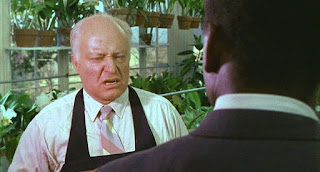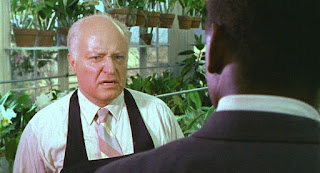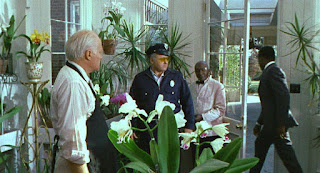The Story: In the DVD commentary track of In the Heat of the Night (with director Norman Jewison, cinematographer Haskell Wexler, Lee Grant and Rod Steiger), Jewison can't remember who came up with it, but it wasn't initially in the script (although it was put in a revised script at the time of filming).
It was the slap. The first time a black man slapped a white man in a motion picture. Although it had been long past due.
No one remembers,* but in Mark Harris' "Pictures at the Revolution: Five Movies and the Birth of the New Hollywood," once it was put on celluloid, it was still considered controversial.
At the first screening in San Francisco, Jewison was aggrieved to hear laughter in the audience at two dramatic points—specifically, the line "They call me Mister Tibbs!" and this slap—and was considering removing both, when his editor (and future director) Hal Ashby—a cooler, hipper head—advised him that the crowd, rather than thinking it was funny, was actually enjoying it. Jewison thought those moments would certainly shock an audience...but he hadn't quite made the leap that they'd approve. Both stayed. The film went on to do well at the box office and won the the Best Picture Oscar that year, over Bonnie and Clyde, The Graduate, Guess Who's Coming to Dinner (also featuring Poitier) and...Dr. Dolittle (which...believe it or not...almost featured Poitier).
If there was a King of Cool in the 60's, I wouldn't go with the usual answer of Steve McQueen, I'd go with Sidney Poitier. Yes, he could be a bit of a poser, but, he was also quietly subversive, especially here. Coming up from playing angry juveniles and token roles, Poitier rather quickly rose up the cast-lists to be become a featured player and then, starring roles in, co-starring in The Defiant Ones, then starring in Porgy and Bess, A Raisin in the Sun, Pressure Point, until he became the clear name-above-the-title with Lillies of the Field, for which he won the Best Actor Oscar becoming the first African-American actor to do so. Perhaps more significantly, Poitier, had the clout that, rather than taking a higher salary, he opted to take a percentage of the film's profits. He had become a box-office draw, no longer dependent on the property he was in or his co-stars. It became obvious that audiences were coming to see him.
That brings power. And Poitier carefully began to pick and choose projects where he could push boundaries to become more that "that nice black man" on-screen, to bring edgier textures, broad subject matter and better opportunities, going on to produce and direct. He knew he had an audience. He was going to use it.
It's always great to watch him work. Jewison and Poitier knew they were treading dangerous ground with the slap, but, after some (I think) unnecessary screen-time waiting for a reaction from the Gillespie and Endicott characters, Poitier's Tibbs answers Endicott's impotent threat "There was a time I could have had you shot" with the slightest of smiles, and straightens the lay of his suit before marching out the door, not even watching his back. Nice. Little details like that always makes Poitier fun to watch...and the King of Cool.
The Set-Up: Wealthy industrialist and contractor Philip Colbert has been found dead in an alley-way of Sparta, Mississippi. That doesn't happen much in small-town Sparta, and Police Chief Bill Gillespie (Rod Steiger) is under some pressure to find out who the killer is. He's grasping at straws and jailing anyone—even one of his officers (Warren Oates) on just a suspicion. The first person he suspects is the stranger waiting for a train at a bus station; he turns out to be Detective Virgil Tibbs (Sidney Poitier) from Philadelphia visiting his mother in Sparta. After talking to Tibbs' superior, Gillespie recruits him to help solve the murder and the two begin a mutually-suspicious inquiry of suspects, given Tibbs' lines of inquiry. He knows the killer bludgeoned Colbert, that he moved the body to the alley-way, that he's right-handed, and that—driving the victim's car after the murder—there were traces of osmunda—fern root—on the car's brake. Tibbs and Gillespie go to speak to Eric Endicott (Larry Gates)—of Endicott Cotton—a prominent Sparta resident, and who opposed Colbert's factory, fearing an influx of new African-American workers to the area.
Action.
Gillespie and Tibbs
CLOSE MOVIING SHOT - The two men
TIBBS AND GILLESPIE
He rings the bell.
(a beat)
TIBBS Fern root?
Gillespie remains baffled.The door opens. Inside an elderly Negro butler with white hair looks out, past Gillespie towards Tibbs.
BUTLER Please come in, Yes, suh. He's out in the greenhouse.
Gillespie enters, Tibbs following.
He seems tense and out-of-place. Tibbs, on the contrary, seems at ease.They hear footfalls, see Endicott appear through the french doors leading to the adjoining greenhouse. He is wearing an apron and carrying a tiny instrument used by orchid-fanciers for cross-pollination. He looks rich, secure, cultured, and affable, King of the Haves.
DETECTIVE VIRGIL TIBBS: How do you do, sir?
TIBBS (interrupting): Well,
TIBBS: Well, I'm partial to any of the epiphytics.
ENDICOTT: That's somethin' you can't make
some people understand.
ENDICOTT: That's somethin'
Mr. Colbert didn't realise.
ENDICOTT: That's osmunda. Fern root.
TIBBS: ...clarify some of the evidence.
Endicott, still saying nothing, continues to advance.
Endicott is closer now.
Now Endicott is directly in front of Tibbs. He swings a smarting blow at the negro, his open palm resounding on Tibbs' cheek.
Tibbs responds instantly, slapping him back as hard - or possibly harder, the blow virtually rattling Endicott's head.
Words by Stirling Silliphant
Pictures by Haskell Wexler and Norman Jewison
In the Heat of the Night is available on DVD and Blu-Ray from MGM Home Entertainment.
* The first draft has this appear after Endicott's slap: "Tibbs has all he can do to restrain himself. The butler drops his head, starts to pray. 'For him, Uncle Tom', Tibbs says furiously, 'not for me!'" That doesn't feel playable to me...certainly not by Poitier...yeah, better and more efficient to just back-hand the guy.
The Viviene Sanders' book "Civil Rights and Race Relations in the U.S." cites Poitier as the inspiration quoting him: "I said, 'I'll tell you what, I'll make this movie for you if you give me your absolute guarantee when he slaps me I slap him right back and you guarantee that it will play in every version of this movie. I try not to do things that are against nature."



















































































































































No comments:
Post a Comment